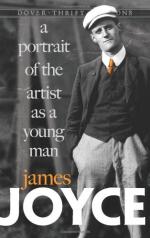|
|
A Portrait of the Artist as a Young Man Quotes
Quote 1: "Once upon a time and a very good time it was there was a moocow coming down along the road and this moocow that was coming down along the road met a nicens little boy named baby tuckoo...." Part 1, page 3
Quote 2: "Stephen Dedalus
Class of Elements
Clongowes Wood College
Sallins
County Kildare
Ireland
Europe
The World
The Universe" Part 1, page 12
Quote 3: "By thinking of things you could understand them." Part 1, page 43
Quote 4: "The noise of children at play annoyed him and their silly voices made him feel, even more keenly than he had felt at Clongowes, that he was different from others. He did not want to play. He wanted to meet in the real world the unsubstantial image which his soul so constantly beheld." Part 2, page 67
Quote 5: "During this process all these elements which he deemed common and insignificant fell out of the scene. There remained no trace of the tram itself nor of the trammen nor of the horses: nor did he and she appear vividly. The verses told only of the night and the balmy breeze and the maiden lustre of the moon. Some undefined sorrow was hidden in the hearts of the protagonists as they stood in silence beneath the leafless trees and when the moment of farewell had come the kiss, which had been withheld by one, was given by both." Part 2, page 74
Quote 6: "A vision of their life, which his father's words had been powerless to evoke, sprang up before him out of the word cut in the desk." Part 2, page 95
Quote 7: "He recalled his own equivocal position in Belvedere, a free boy, a leader afraid of his own authority, proud and sensitive and suspicious, battling against the squalor of his life and against the riot of his mind." Part 2, page 96
Quote 8: "He closed his eyes, surrendering himself to her, body and mind, conscious of nothing in the world but the dark pressure of her softly parting lips. They pressed upon his brain as upon his lips as though they were the vehicle of vague speech; and between them he felt an unknown and timid pressure, darker than the swoon of sin, softer than sound or odour." Part 2, page 108
Quote 9: "It was his own soul going forth to experience, unfolding itself sin by sin...." Part 3, page 110
Quote 10: "looking humbly up to heaven, he wept for the innocence he had lost." Part 3, page 150
Quote 11: "His destiny was to be elusive of social or religious orders.... He was destined to learn his own wisdom apart from others or to learn the wisdom of others himself wandering among the snares of the world." Part 4, page 175
Quote 12: "The snares of the world were its ways of sin. He would fall. He had not yet fallen but he would fall silently, in an instant." Part 4, page 175
Quote 13: "Did he then love the rhythmic rise and fall of words better than their associations of legend and color? Or was it that, being as weak of sight as he was shy of mind, he drew less pleasure from the reflection of the glowing sensible world through the prism of a language manycolored and richly storied than from the contemplation of an inner world of individual emotions mirrored perfectly in a lucid supple periodic prose?" Part 4, page 180
Quote 14: "Yes! Yes! Yes! He would create proudly out of the freedom and power of his soul, as the great artificer whose name he bore, a living thing, new and soaring and beautiful, impalpable, imperishable." Part 4, page 184
Quote 15: "His thinking was a dusk of doubt and self-mistrust lit up at moments by the lightnings of intuition, but lightnings of so clear a splendor that in those moments the world perished about his feet as if it had been fireconsumed...." Part 5, page 191
Quote 16: "His language, so familiar and so foreign, will always be for me an acquired speech. I have not made or accepted its words. My voice holds them at bay. My soul frets in the shadow of his language." Part 5, page 205
Quote 17: "The artist, like the God of the creation, remains within or behind or beyond or above his handiwork, invisible, refined out of existence, indifferent, paring his fingernails." Part 5, page 233
Quote 18: "I will not serve." Part 5, page 260
Quote 19: "To discover the mode of life or of art whereby [my] spirit could express itself in unfettered freedom." Part 5, page 267
Quote 20: "I will tell you what I will do and what I will not do. I will not serve that in which I no longer believe whether it call itself my home, my fatherland or my church: and I will try to express myself in some mode of life or art as freely as I can and as wholly as I can, using for my defense the only arms I allow myself to use--silence, exile, and cunning." Part 5, page 268
Quote 21: "I do not fear to be alone or to be spurned for another or to leave whatever I have to leave. And I am not afraid to make a mistake, even a great mistake, a lifelong mistake and perhaps as long as eternity too." Part 5, page 269
Quote 22: "Welcome, O life! I go to encounter for the millionth time the reality of experience and to forge in the smithy of my soul the uncreated conscience of my race." Part 5, page 275
Quote 23: "Old father, old artificer, stand me now and ever in good stead." Part 5, page 276




